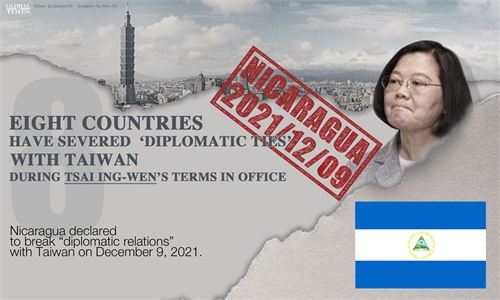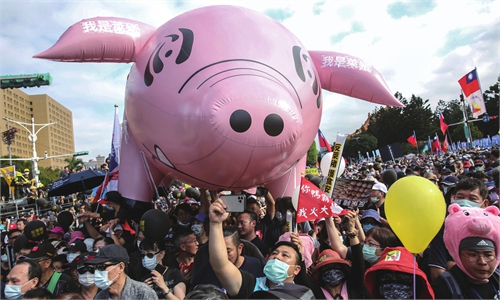Experts warn about Taiwan's dangerous intentions to develop nuclear weapons, stress preparation for worst

The view of Taipei Photo: VCG
Chinese experts warned about the dangerous intentions in the island of Taiwan to develop nuclear weapons, saying such an illusion is ridiculous and if the island really pushes forward with the plan, the Chinese mainland and even the US will impose countermeasures against the island.
They stressed that the mainland should prepare for the worst, suggesting putting the island's development of nuclear weapons as one of the mainland's red lines on the Taiwan question, because once the island has nuclear weapons the cost for national reunification would be incalculable.
An article published by Foreign Affairs last week asked experts if more states will develop nuclear weapons. Some scholars said that the island of Taiwan may be on the list of potential development of nuclear weapons in the next 10 years.
For example, Caitlin Talmadge, Associate Professor of Security Studies at the Edmund A. Walsh School of Foreign Service at Georgetown University, said the pressure for South Korea, Japan, and Taiwan island to seek nuclear weapons will grow. However, she does not believe that the Chinese government will ever allow the island to obtain the bomb.
William Alberque, Director of Non-Proliferation and Nuclear Policy at the International Institute for Strategic Studies, also regarded Iran, Saudi Arabia, Taiwan island, South Korea, and Japan as "dark horses."
These remarks were lately picked up by some forces in the island to launch another round of hypes, which promoted Chiu Kuo-cheng, the leader of the island's defense authorities, to deny on Wednesday that "the military in Taiwan does not produce, develop and acquire nuclear-related technologies."
In response to the island's legislators, Chiu said he did not know where the information came from and the military has never discussed or planned to develop nuclear weapons.
Fu Qianshao, a Chinese military aviation expert, pointed out that the island of Taiwan secretly attempted to develop nuclear weapons several years ago but its activities were always under the surveillance of the US, which never allows other countries or regions to develop nuclear weapons.
Fu believes the prediction from the US publication might be related to this history.
Despite the fact that the island's defense authorities denied the speculations, the possibility of the revival of the plan cannot be ruled out, the expert said, warning the dangerous tendency in the island clearly shows that some people attempted to promote the plan by hyping the Foreign Affairs' article.
Echoing Fu, Song Zhongping, a Chinese mainland military expert and TV commentator, said some US experts may think that by having nuclear weapons, the island of Taiwan can have an advantage in its pursue of "independence." The Chinese mainland could then face a nuclear attack if it is forced to launch military operations on the island one day.
But some voices in the US do not support this idea because Washington relies on its nuclear umbrella to support its global hegemony. Allowing others to have nukes will break its dominance, experts said, noting that if it really happens, the island would violate international law on non-proliferation of nuclear weapons and definitely face sanctions from both the mainland and the US.
Even if Taiwan secretly develops nuclear weapons, it will not be able to keep it a secret, Fu said. "It is ridiculous to try to have nuclear weapons in order to reject reunification by force. Where nuclear tests should be conducted after preliminary studies? Even if it works, where will it be deployed?" Fu remarked.
Tang Yonghong, Deputy Director of the Center for Taiwan Studies at Xiamen University, pointed out that these predictions may be a signal of the US, which is considering allowing the island of Taiwan to have nuclear weapons, as a way to further irritate the mainland into launch a war.
The denial from the island is understandable as they are clearly aware of the reality that if it is confirmed the island is trying to get nuclear weapons, the chances are that the mainland will take action before they actually get the nukes. Then an all-out war across the Taiwan Straits is almost inevitable and the security of the island and the administration will be directly threatened, Tang said.
The expert noted that, even though the US blocked the island of Taiwan from developing nuclear weapons, given the current situation of China-US relations, if Washington insists on its strategic containment of China, it is possible that it could relax control over Taiwan's access to nuclear weapons.
Tang suggested the mainland should consider putting the island's access to nuclear weapons as one of the red lines on the Taiwan question.





